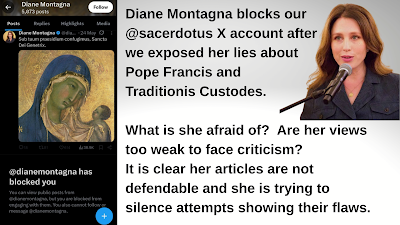Diana Montagna’s Block on X: A Sign of Weak Journalism?In the fast-paced world of journalism, credibility hinges on the ability to stand by one’s work, engage with criticism, and defend claims with evidence.
Recently, journalist Diana Montagna’s decision to block @Sacerdotus on X after their critique of her articles has raised eyebrows. This move, rather than engaging with the criticism, suggests her work may lack the rigor to withstand scrutiny. Let’s explore why this action casts doubt on her credibility and the strength of her reporting.
The Context: @Sacerdotus Calls Out Montagna’s Claims
On July 7 and 10, 2025, X user @Sacerdotus posted critiques of Montagna’s articles, accusing her of spreading falsehoods about Pope Francis and rehashing unverified claims without providing new evidence. Specifically, @Sacerdotus challenged her for failing to include verified documentation and for relying on recycled, unconvincing content to push her narrative. These posts, which called for accountability and evidence, were met not with a robust defense but with Montagna blocking @Sacerdotus on X.
Here are our articles refuting Diane's lies and showing her inconsistencies:
We questioned her latest claims in an X post, which most likely triggered her block:
Why did you not include this in your first article? All you did was rehash the same banal content. You provided no new evidence. You simply backtracked and posted random documentation that are not verified and do not provide proof of your claims in hopes to convince the naive…
— ☧✝️Sacerdotus™⚛✡🇻🇦☧ (@Sacerdotus) July 10, 2025
Blocking Criticism: A Red Flag for Credibility
When a journalist blocks a critic rather than addressing their points, it sends a troubling message. Criticism, especially in the public square of X, is a crucible for testing the strength of one’s work. By choosing to silence @Sacerdotus, Montagna avoided the opportunity to defend her articles with facts or counterarguments. This suggests her claims may be too weak to withstand scrutiny, as a confident journalist would engage, refute, or clarify rather than retreat.
The act of blocking implies an inability—or unwillingness—to stand by her content. As Theodore Roosevelt once said, “It is not the critic who counts… The credit belongs to the man who strives, who dares greatly, and who perseveres despite criticism.” By shutting out critique, Montagna sidesteps the striving and perseverance that define credible journalism. Her actions align more with Aristotle’s quip: “There is only one way to avoid criticism: do nothing, say nothing, and be nothing.” In this case, her silence speaks volumes.
Why Her Articles Are “Bunk”
@Sacerdotus’s posts pointed out specific issues with Montagna’s reporting, including a lack of new evidence and reliance on unverified documentation. Without engaging these critiques, Montagna leaves the impression that her articles cannot be defended. Journalism demands transparency and accountability—qualities absent when a writer dodges vetting. If her claims about Pope Francis or other topics were grounded in solid evidence, she could have easily countered @Sacerdotus with primary sources, verified documents, or a reasoned argument. Instead, her block suggests her work may crumble under the “fire of criticism and vetting.”
This pattern isn’t unique to Montagna. Other figures, like Diana Nyad, faced similar accusations of falsehoods and struggled to defend their claims when confronted with evidence. Nyad’s PR team, for instance, avoided direct responses to critics, much like Montagna’s block of @Sacerdotus. When journalists or public figures evade scrutiny, it often signals that their narratives rely on shaky foundations.[](https://defector.com/diana-nyads-swimming-brought-her-glory-fame-and-an-adversary-dedicated-to-exposing-her-lies)
The Broader Implications
Montagna’s decision to block criticism reflects a broader issue in modern journalism: the temptation to prioritize narrative over truth. When journalists silence detractors rather than engage, they undermine their own credibility and erode public trust. X, as a platform, thrives on open discourse, where ideas are tested and falsehoods exposed. By opting out of this process, Montagna not only weakens her own standing but also fuels skepticism about her work’s reliability.
Winston Churchill once noted, “You have enemies? Good. That means you’ve stood up for something, sometime in your life.” Facing criticism head-on is a badge of courage for those who stand by their convictions. Montagna’s block, however, suggests she’s unwilling to defend her stance, leaving readers to question whether her articles are more about pushing an agenda than uncovering truth.
Credibility Requires Courage
Diana Montagna’s choice to block @Sacerdotus rather than address their critiques is a telling moment. It suggests her articles may lack the substance to withstand rigorous vetting, as credible journalism should. By avoiding the fire of criticism, she casts doubt on her ability to stand by her content, leaving readers to wonder if her reporting is more “bunk” than truth. In an era where accountability is paramount, journalists must embrace scrutiny, not hide from it. Until Montagna engages with her critics openly, her credibility—and the integrity of her work—will remain in question.
UPDATE July 13, 2025
Diana also blocked us on her Substack.




No comments:
Post a Comment
Thank you for reading and for your comment. All comments are subject to approval. They must be free of vulgarity, ad hominem and must be relevant to the blog posting subject matter.